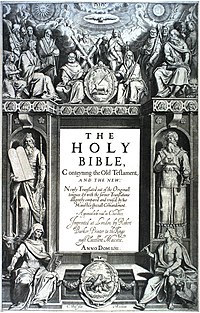 Holy Bible: King James Version by Anonymous
Holy Bible: King James Version by AnonymousMy rating: 5 of 5 stars
2011 marked the 400th anniversary of the publication of the King James Bible, and it remains the finest English translation there is. "No other book has given more to the English-speaking world," writes Adam Nicolson in the December 2011 issue of National Geographic. Robert Alter's latest book, Pen of Iron: American Prose and the King James Bible, studies the King James Bible's influence on the writing styles of the greatest American writers from Whitman, Dickinson, and Melville to Faulkner. Alter laments that "the King James Bible has ceased to be the almost universally used translation as readers have been encouraged to read more 'accessible' versions, which also happen to be stylistically inferior in virtually all respects." (pp. 9-10) By some counts the KJV has contributed even more idioms to English than Shakespeare did; Nicolson declares that "It molded the English language."
The KJV was produced during Shakespeare's lifetime, in the first decade of the 17th century. According to the Folger Shakespeare Library, Shak read the Geneva Bible of 1560 like most other Englishmen, and it's obvious to me that Shakespeare owed much to the excellent studies of character and of psychical change in the Hebrew Bible. It's also tempting to imagine that he repaid that debt, and did so with characteristic magnificence and humility. To argue as much is careless speculation, and the argument's entanglement with the number 46 imparts to it an odor of cabbala or other voodoo thinking (an odor that it ultimately merits). If it seems miraculous that Shakespeare may have contributed to the King James translation of the Bible, however, then it seems at first glance like a miracle that satisfies David Hume's criteria for credibility: that is to say, the idea of Shakespeare having contributed to the King James Bible, miraculous or no, at first looks more plausible than the alternative (that he didn't). To an amateur scholar like me, it appeared the most plausible explanation, namely, for the King James version of Psalm 46.
As I learned from Goodreads trivia, if you count 46 words from the beginning of Psalm 46 and 46 words from the ending of the psalm (not counting the "Selahs"), you arrive at these two words: "shake" and "spear." Try it. It also happens that Shakespeare would have been 46 years old in 1610, when scholars were finalizing the translations for publication the following year. So was this the translators' birthday tribute to Shakespeare in April 1610? Or did Shakespeare actually look at the drafts and buff them up here and there like a Hollywood script doctor? Did he perhaps insert a disguised autograph into Psalm 46? Given Shakespeare's connections at court with both Queen Elizabeth and King James, and given King James's assemblage of a committee of over 50 known scholars, writers, and translators to work on the text, it's tempting to imagine that King James asked Shakespeare to take a peek at the translations and weigh in or even contribute edits.
And yet, Shakespeare, with his "small Latin and less Greek," as Ben Jonson said, was not quite a scholar like the rest of the King's biblical team--and neither am I! A letter in the January 11, 2012 Times Literary Supplement from a bonafide scholar points to pretty conclusive proof that Shakespeare's authorship of Psalm 46 is no more than a "hoary myth." It seems that Miles Coverdale's translation of the psalms, published in a 1549 edition of The Book of Common Prayer--fifteen years before Shakespeare's birth--reads just about the same, with the word "shake" exactly 46 words from the beginning and "spear" almost exactly 46 words from the end (in fact 48). Alas, the miracle fails Hume's credibility test after all and must be attributed to weird coincidence.
I suppose it appealed to my innate sense of belligerence to defend the Bard's honor against that other hoary myth--that he didn't write the plays--by fighting the fire of dubious speculation with the fire of possibly slightly less dubious speculation. This article does a better job in Shakespeare's defense. And in the end, the notion that Shakespeare helped out the KJV probably slights the KJV in the same way that the theory of an earl writing Shakespeare's plays slights the writer from Stratford. The truth is that the ancient writers of the Bible needed no help, and neither did their magnificent English translators.
View all my reviews
No comments:
Post a Comment